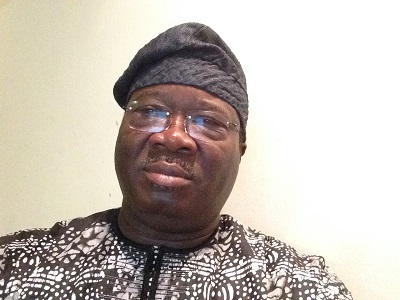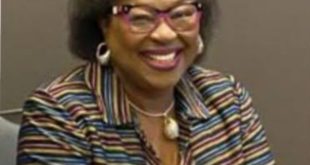By Kenneth Jukpor

Engr. Emmanuel Ilori is the 2nd Vice President of the Association of Marine Engineers and Surveyors (AMES). He is also the Assistant Chaplain of the Management Committee of Mission To Seafarers (MTS) Lagos. In this interview with MMS Plus newspaper, he speaks on an array of issues in the nation’s maritime sector with a keen interest on the importance of welfare of seafarers as a strategy to end the war risk insurance on cargoes heading to the nation. Excerpts:
Few months ago you led a reform committee to enhance Nigeria’s ship registry; what is the current state of ship registry in Nigeria and what are the areas that require improvement?
As a committee we made some recommendations to Nigerian Maritime Administration and Safety Agency (NIMASA) on the ship registry and the good news is that we can begin to see traction on the ship registry issues that we itemized. The hard fact is that the ship registry won’t turn around overnight but the journey of a thousand miles starts with a step.

The most important thing now is that the issues are being addressed. The agency put together experts who know the industry in and out to review the ship registry and there are very strong reports. The most important thing I keep reiterating is that the three plans under which the ship registry stands must be addressed.
One of the things they’ve done is to create a friendly business environment and prioritize integrity. Our certificates, either ship registry or for seafarers are open to forgery and these are things making us less attractive to shipping businesses as a nation. In a situation where a company wants to employ a Nigerian cadet and finds out that his/her certificate is forged, this situation does not help the image of the nation.

The issue of insecurity is also being addressed which is going to have an impact on the ship registry. There is still lots of work to do but the important thing is that there must be a willingness to engage with the issues and I think the current Director General of NIMASA, Dr. Bashir Jamoh is showing willingness to do that and he must be encouraged. The media also needs to raise awareness on the importance of a credible ship registry because the media is the eyes and ears of the industry.

NIMASA is yet to deploy the floating dock to the Continental shipyard as promised, how would you react to that?
As a group, the Association of Marine Engineers and Surveyors (AMES) is concerned as a body of professionals and as Nigerian, everyone should rightly be concerned. The floating vessel is a welcome development and anything that will improve ship dry docking in Nigeria is definitely a step in the right direction. This will reduce the number of people going out of the country to dry dock their vessels and it’ll conserve our foreign reserve. The fact that the floating dock has not been deployed means we need to be asking questions about why this is yet to happen.
We’ll dialogue with NIMASA again to know the state of things, although the Director General made some promises and asked for time because these issues are stuck in bureaucracy. Unfortunately, as professionals, we’ll have preferred that the issue of dry docking is not embroidered in bureaucratic issues. In the hands of a businessman, a multi-million dollar investment wouldn’t have to face these many challenges. We’ll continue to raise the awareness that the government should allow the maritime industry to grow. Government should remove these obstacles and let the Nigerian maritime sector enjoy the benefits of the floating dock.
It’s not an issue of location because wherever they put it, it’s going to enrich and empower that community. As long as the facility is visible and safe, I’m sure there won’t be an issue. It will be beneficial to the industry and that’s what we are asking. I think the issue is accessibility, if they decide to put it in Lagos, that’s okay. We have the manpower available, but if they decide to put it outside Lagos, it is also fine. The agency had ample time, about 3 or 4 years to decide the location of the floating dock.
The dearth of marine surveyors and engineers has been a well documented problem, what’s the latest on addressing this?
That’s a national problem because when we had the national shipping line with engineers still in training, we had people who could develop experience. Marine engineering is not an abstract part of engineering. If you want to become a Chief Engineer, your degree is just the starting point. A Marine Engineer starts as a junior officer to gather experience then go back to college again for training after sea time experience. So, it’s a national problem because one of the challenges they have is the non-availability of the vessel for sea time experience.
Marine engineering is not a profession that anybody can just go into, not many people survive the initial training of going on the sea. Anybody can survive four years in the university but when you begin to go onboard a vessel then you’ll face the challenges of the sea and not so many people can survive that training. The attrition level in the development of marine engineers and captains is very high, so these are the challenges we need to address.
Until we begin to have foreign vessels give our officers sea time experience, they will continue to struggle. Only NLNG at the moment is employing Nigerians and they’re going overseas, they have the right size of vessels so they’re the ones giving contribution towards the development of these vital skill sets.
The Cathedral Church of Christ, Marina participated in the annual Sea Sunday to celebrate seafarers, how Important are these seafarers to the industry and global trade?
Seafarers are the unsung heroes of the global economy and the church is a large community of people. This event is global, it’s been celebrated at St Paul’s Cathedral, London and Nigeria being a super nation is playing its role. We are blessed that the Cathedral Church of Lagos is hosting a sea Sunday dedication. This shows the importance we attach to seafarers. They don’t only need our prayers, they also need our support.
Global economy will come to a halt without the efforts of the seafarers, this shows their efforts and how significant they are but they’re not recognised. Everybody seems to forget that without the seafarers we can’t get the cars we drive, the clothes we wear, even the food we eat. It’s important for me not only as a seafarer but also as part of the maritime community to discuss the importance of seafarers to our economy.
Unfortunately, even though Nigeria is still lagging in the international seafaring community, we must not forget the welfare of seafarers who come to the nation’s port. The challenges they face are significant yet we’re putting so much emphasis on global insecurity on the seas. Let us think about what these seafarers are going through. Recently, we have been talking about ending war risk insurance on goods that come to Nigerian waters and the focus is on security, on other hand, if 50 seafarers who visit the nation’s port go back to their countries saying positive things they experienced then that’ll start to change the perception that Nigeria is not safe. Don’t forget this issue of safety is what people experience but when we begin to engage the issues with the most important people who are the seafarers, then we can start to see a change in the narrative.
 MMS PLUS NG – Maritime, Aviation, Business, Oil and Gas News Online Newspaper with coverage in Maritime, Oil and Gas, Aviation, Power and Energy as well as Financial News
MMS PLUS NG – Maritime, Aviation, Business, Oil and Gas News Online Newspaper with coverage in Maritime, Oil and Gas, Aviation, Power and Energy as well as Financial News









